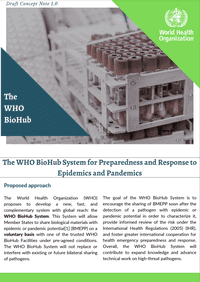WHO BioHub System Draft Concept Note
[BioHub System]
The BioHub System is a network of coordinated BioHub Facilities that enable the rapid sharing of viruses and other pathogens globally. The Facilities will receive, sequence, store and ship these pathogens to labs around the world under pre-agreed conditions that include biosafety and biosecurity, this way new agreements do not have to be signed every time pathogen samples move.
SUMMARY
The World Health Organization (WHO) BioHub System is a network of coordinated BioHub Facilities that enable the rapid sharing of viruses and other pathogens globally. The Facilities will receive, sequence, store and ship these pathogens to labs around the world under pre-agreed conditions that include biosafety and biosecurity, this way new agreements do not have to be signed every time pathogen samples move. Rapid sharing of pathogens is key to understanding and preventing the spread of viruses and pathogens with pandemic potential. The BioHubs will enable countries to do risk assessment of emerging diseases under the International Health Regulations (IHR) and allow medical countermeasures to be developed in a timely fashion.
The BioHub effort is currently in its pilot phase, with one Facility opening in Switzerland. During the testing phase, SARS-CoV-2 will be the test sample for the non-commercial sharing of Biological Materials with Epidemic or Pandemic Potential (BMEPP). The WHO is asking countries to share and receive SARS-CoV-2 samples with the BioHub under Standard Material Transfer Agreements (SMTA). Working with the BioHub system is completely voluntary for countries and the system is designed to link into a country's trusted laboratory and repository networks. The initial concept note outlining this system was published in April 2021 and the next update is scheduled for the end of 2022.


..png)
